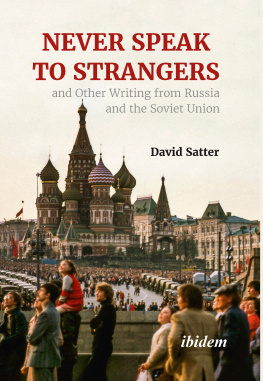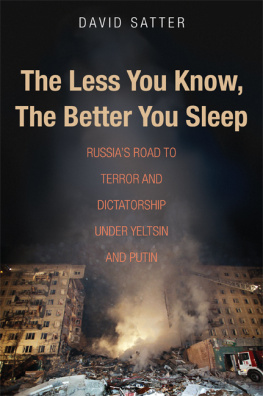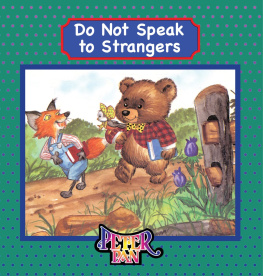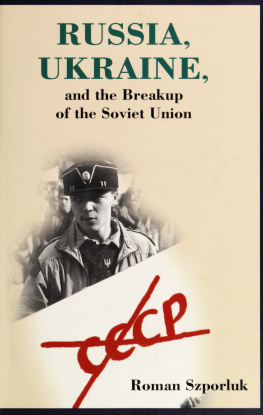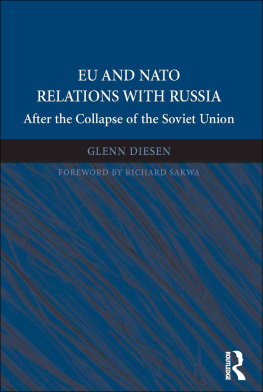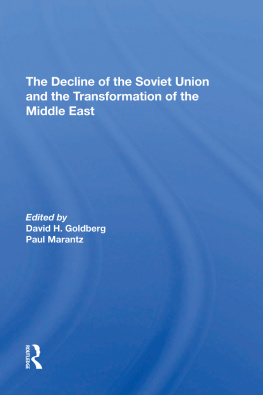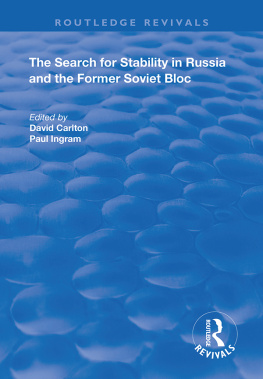David Satter - Never Speak to Strangers and Other Writing from Russia and the Soviet Union
Here you can read online David Satter - Never Speak to Strangers and Other Writing from Russia and the Soviet Union full text of the book (entire story) in english for free. Download pdf and epub, get meaning, cover and reviews about this ebook. year: 2020, publisher: Ibidem Press, genre: Detective and thriller. Description of the work, (preface) as well as reviews are available. Best literature library LitArk.com created for fans of good reading and offers a wide selection of genres:
Romance novel
Science fiction
Adventure
Detective
Science
History
Home and family
Prose
Art
Politics
Computer
Non-fiction
Religion
Business
Children
Humor
Choose a favorite category and find really read worthwhile books. Enjoy immersion in the world of imagination, feel the emotions of the characters or learn something new for yourself, make an fascinating discovery.
- Book:Never Speak to Strangers and Other Writing from Russia and the Soviet Union
- Author:
- Publisher:Ibidem Press
- Genre:
- Year:2020
- Rating:3 / 5
- Favourites:Add to favourites
- Your mark:
- 60
- 1
- 2
- 3
- 4
- 5
Never Speak to Strangers and Other Writing from Russia and the Soviet Union: summary, description and annotation
We offer to read an annotation, description, summary or preface (depends on what the author of the book "Never Speak to Strangers and Other Writing from Russia and the Soviet Union" wrote himself). If you haven't found the necessary information about the book — write in the comments, we will try to find it.
David Satter: author's other books
Who wrote Never Speak to Strangers and Other Writing from Russia and the Soviet Union? Find out the surname, the name of the author of the book and a list of all author's works by series.
Never Speak to Strangers and Other Writing from Russia and the Soviet Union — read online for free the complete book (whole text) full work
Below is the text of the book, divided by pages. System saving the place of the last page read, allows you to conveniently read the book "Never Speak to Strangers and Other Writing from Russia and the Soviet Union" online for free, without having to search again every time where you left off. Put a bookmark, and you can go to the page where you finished reading at any time.
Font size:
Interval:
Bookmark:

ERZEUGT DURCH JUTOH - BITTE REGISTRIEREN SIE SICH, UM DIESE ZEILE ZU ENTFERNEN
ibidem -Press, Stuttgart
ERZEUGT DURCH JUTOH - BITTE REGISTRIEREN SIE SICH, UM DIESE ZEILE ZU ENTFERNEN
Content
ERZEUGT DURCH JUTOH - BITTE REGISTRIEREN SIE SICH, UM DIESE ZEILE ZU ENTFERNEN
Administrative Delineations
FSB Federal Security Service
FSO Federal Guard Service
IMF International Monetary Fund
KGB Committee for State Security
RUBOP (formerly RUOP) Regional Directorate for the Struggle with Organized Crime
SVR Foreign Intelligence Service
Krai Province or territory
Oblast Region
Raion District
Okrug Administrative subdivision, for example, of Moscow or military district
ERZEUGT DURCH JUTOH - BITTE REGISTRIEREN SIE SICH, UM DIESE ZEILE ZU ENTFERNEN
The Marquis de Coustine, writing in the early 19th century, said that it was possible for a foreigner to travel from one end of Russia to the other and see nothing but false facades. In June, 1976, when I arrived in Moscow as the accredited correspondent of the Financial Times of London, I was confronted by a country that resembled nothing so much as a giant theater of the absurd.
I spent six years in the Soviet Union, from 197682. During this period, I sensed the uniqueness of the situation and began collecting the personal stories of Soviet citizens with the intent of preserving them for posterity. I was banned from the Soviet Union after 1982, allowed back in 1990, and finally expelled from Russia in 2013 on the grounds that the security organs regarded my presence as undesirable.
During these years, I observed four different Russias which managed to differ radically from each other while remaining essentially the same. From 1976 to 1982, I witnessed the Soviet Union at the height of its world power and a people in a state of ideological stupefaction. With the advent of Gorbachevs perestroika, the Soviet population was liberated from the unreal world of the ideology and the state hurtled to its inevitable collapse. When independent Russia emerged from the wreckage, the failure to replace the missing ideology with a genuine set of universal moral values led to Russias complete criminalization.
Finally, the unreal world of the Soviet ideology took its revenge in September, 1999 with the bombing of four Russian apartment buildings that made possible Vladimir Putins rise to power and the resurrection in Russia of the Soviet Union in a different guise.
The imaginary world of Marxist-Leninist ideology never really went away because the issue was never its validity but rather its political effectiveness. Mentally subjugated individuals can be treated as raw material for the purposes of the state which is why an ideology is so useful. By the time I was expelled from Russia in 2013, the re-propagandizing of Russia had been long accomplished and Russia is in a state of ideological control without an ideology to this day.
As Russia evolved, the conditions of work for a journalist also changed. During the Brezhnev period, all official information was organized to confirm the truth of the imaginary world. Real information was available but it was unofficial and getting it entailed taking a risk. This accounted for the unique role of the Soviet dissidents. They took it upon themselvesand often paid for their efforts with terms in Soviet labor campsto provide truthful information about historical events and the conditions in the country to diplomats and journalists. The best informed foreign journalists were those with the closest ties to dissidents.
During the perestroika period, the regime itself began to release information that, had it been published months earlier by a dissident would have led to the latters arrest. Gorbachev wanted to use limited freedom to, as he put it, unleash the potential of socialism. This was only possible, however, by lifting the dead hand of the ideology which meant free information. For journalists, this situation was nearly incomprehensible. The regime seemed to be organizing its own demise. But journalists were not the only ones who were confused. Gorbachevs effort to reform the Soviet Union by undermining the credibility of its ideology led inevitably to the Soviet Unions collapse.
After the fall of the Soviet Union, journalists faced a country that, while no longer communist, was taken over by criminals and so was not truly free. If the Soviet Union was justified by the myths of communism, Yeltsins Russia was justified by the myth of democratic, anti-communist reform. Foreign journalists could travel and write freely (although Russian journalists were frequently killed) but they had to struggle to distinguish appearance from reality. The endurance of the belief that the Yeltsin period was the flowering of Russian democracy is a tribute to the fact that very few journalists passed that test.
In September, 1999, Western journalists in Russia faced their greatest challenge as apartment buildings were blown up in the middle of the night and evidence mounted that the perpetrators were agents of the Russian Federal Security Service (FSB). The bombings were used to justify a new invasion of Chechnya which helped Putin to become Russias new president. Putin restored the institutions of the Soviet Unionfalse propaganda, militarism and hostility to the West. But as Putins grip on power tightened and the apartment bombings were followed by assassinations and new provocations, journalists largely restricted themselves to the official version of events, leaving the reality of Putins Russia concealed by ever more elaborate lies.
The articles in this collection are a chronicle of Russia almost from the day I arrived in the Soviet Union as a young correspondent in 1976 until the present. Depicted here are the things I saw, the people I met and the events I witnessed as reported by me to my readers in the West. In the broad sense, this is a record of one persons attempt to penetrate the false reality of a country which was not like other countries but always sought to depict itself as something it is not.
Emigres from the former Soviet Union often despair of their inability to convey the truth of their experiences to the West. Arthur Koestler, a former communist and the author of Darkness at Noon, the classic novel about the Moscow purge trials of the 1930s, told a colleague that it was always the same with the comfortable and insular West. You hate our Cassandra cries and resent us as allies, he said. But when all is said, we ex-communists are the only people who know what its all about.
In fact, it is not necessary to be an ex-communist to understand what it is all about. But penetrating the veil of Russian mystification requires effort and the ability to understand that seeing is not always believing. The Russians have created an entire false world for our benefit. The articles in this collection reflect my 40 year attempt to see them as they are.
ERZEUGT DURCH JUTOH - BITTE REGISTRIEREN SIE SICH, UM DIESE ZEILE ZU ENTFERNEN
By David Satter
February, 1977
A bleak, overcast day in Riga had given way to a night that was clear and bitter cold. The red lights on the last car of the Riga to Tallinn overnight train glowed in the frigid air as the train backed into the station. I gathered my things and walked to the seventh car where I handed in my ticket and boarded the train. I entered my compartment and was surprised to see a young woman seated on one of the bunks. She had black hair, which was freshly set, a heart shaped face, pale complexion, and lovely dark eyes. I guessed she was about 28 years old.
Font size:
Interval:
Bookmark:
Similar books «Never Speak to Strangers and Other Writing from Russia and the Soviet Union»
Look at similar books to Never Speak to Strangers and Other Writing from Russia and the Soviet Union. We have selected literature similar in name and meaning in the hope of providing readers with more options to find new, interesting, not yet read works.
Discussion, reviews of the book Never Speak to Strangers and Other Writing from Russia and the Soviet Union and just readers' own opinions. Leave your comments, write what you think about the work, its meaning or the main characters. Specify what exactly you liked and what you didn't like, and why you think so.

